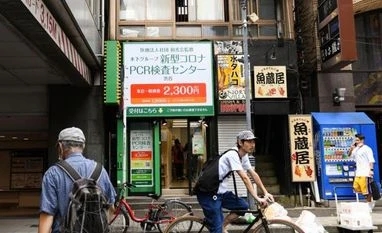Japan's household spending fell in September as consumers remained cautious about the COVID-19 pandemic, backing broad consensus that the world's third-largest economy shrank in the third quarter but pointing to an improvement towards year-end.
The data underscored the need for policymakers to shore up domestic consumption as the global supply crunch hits the export-reliant economy.
Spending fell 1.9% year-on-year in September, with the downturn easing slightly after a 3.0% decrease in August, government data showed on Friday. It was also less severe than a median market forecast for a 3.9% slide in a Reuters poll.
In seasonally adjusted month-on-month terms, spending jumped 5.0% in September, marking the first increase in five months, beating expectations for 2.8% growth.
"As the virus situation and foot traffic improved toward end of September, service spending such as entertainment and education recovered, catching up the earlier trend in goods spending," said Masato Koike, senior economist at Dai-ichi Life Research Institute.
Nationwide coronavirus cases decreased in September after hitting record levels in late August. The government lifted some COVID-19 curbs by end-September, but restrictions such as shorter restaurant hours and caps on large-scale events remained in place in Tokyo and other densely-populated cities until late October.
More From This Section
Many analysts expect the economy to have shrunk in the third quarter. The median forecast for July-September gross domestic product (GDP) growth stood at an annualised contraction of 0.8%, Reuters poll of 18 economists showed on Friday.
Beyond carmakers, supply shortages in semiconductors and other components produced in coronavirus-hit Southeast Asia have caused a ripple effect in other parts of the Japanese economy. Growth in exports has slowed while private consumption stagnated because of slumps in car sales.
The anticipated economic contraction in the third quarter "will highlight Japan's growth lag" compared with other major economies such as the United States and Europe, said Takeshi Minami, chief economist at Norinchukin Research Institute.
The government is due to release a preliminary estimate for July-September GDP on Nov. 15.
To prop up Japan's relatively tepid economic recovery, Prime Minister Fumio Kishida pledged earlier this week to compile a "large-scale" stimulus package in mid-November.
Kishida's government and ruling coalition have agreed to provide a cash payout of 100,000 yen ($879.58) to all children up to age 18 as part of the stimulus package, the Yomiuri newspaper reported on Friday.
"As consumption picks up thanks to eased virus curbs and car production cuts have bottomed out in October, the fourth-quarter GDP growth will be back to a positive territory," Minami said, adding the positive effect of the government's stimulus package will mostly be felt after January 2022.
($1 = 113.6900 yen)
(Reporting by Kantaro Komiya; Editing by Sam Holmes, Richard Pullin & Shri Navaratnam)
)